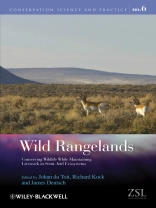Rangeland ecosystems which include unimproved grasslands,
shrublands, savannas and semi-deserts, support half of the
world’s livestock, while also providing habitats for some of
the most charismatic of wildlife species. This book examines the
pressures on rangeland ecosystems worldwide from human land use,
over-hunting, and subsistence and commercial farming of livestock
and crops. Leading experts have pooled their experiences from all
continents to cover the ecological, sociological, political,
veterinary, and economic aspects of rangeland management today.
This book provides practitioners and students of
rangeland management and wildland conservation with a diversity of
perspectives on a central question: can rangelands be wildlands?
* The first book to examine rangelands from a conservation
perspective
* Emphasizes the balance between the needs of people and
livestock, and wildlife
* Written by an international team of experts covering all
geographical regions
* Examines ecological, sociological, political, veterinary, and
economic aspects of rangeland management and wildland conservation,
providing a diversity of perspectives not seen before in a single
volume
Spis treści
Contributors vii
Preface xv
Foreword by Anthony R.E. Sinclair and George B. Schaller xix
1. Introduction: A Review of Rangeland Conservation Issues in an Uncertain Future 1
Monica L. Wrobel and Kent H. Redford
Part I Thematic Reviews 13
2. Riding the Rangelands Piggyback: A Resilience Approach to Conservation Management 15
Brian Walker
3. Addressing the Mismatches between Livestock Production and Wildlife Conservation across Spatio-temporal Scales and Institutional Levels 30
Johan T. du Toit
4. Rangeland Conservation and Shrub Encroachment: New Perspectives on an Old Problem 53
Steven R. Archer
5. Health and Disease in Wild Rangelands 98
Richard Kock, Mike Kock, Sarah Cleaveland and Gavin Thomson
6. Contemporary Views of Human-Carnivore Conflicts on Wild Rangelands 129
Alexandra Zimmermann, Nick Baker, Chloe Inskip, John D.C. Linnell, Silvio Marchini, John Odden, Gregory Rasmussen and Adrian Treves
7. Financial Incentives for Rangeland Conservation: Addressing the 'Show-Us-the-Money’ Challenge 152
Ray Victurine and Charles Curtin
Part II Case Studies 189
8. Biodiversity Conservation in Australian Tropical Rangelands 191
Stephen T. Garnett, John C.Z. Woinarski, Gabriel M. Crowley and Alex S. Kutt
9. Livestock Grazing and Wildlife Conservation in the American West: Historical, Policy and Conservation Biology Perspectives 235
Thomas L. Fleischner
10. Guanaco Management in Patagonian Rangelands: A Conservation Opportunity on the Brink of Collapse 266
Ricardo Baldi, Andrés Novaro, Martín Funes, Susan Walker, Pablo Ferrando, Mauricio Failla and Pablo Carmanchahi
11. Multiple Use of Trans-Himalayan Rangelands: Reconciling Human Livelihoods with Wildlife Conservation 291
Charudutt Mishra, Sumanta Bagchi, Tsewang Namgail and Yash Veer Bhatnagar
12. Herders and Hunters in a Transitional Economy: The Challenge of Wildlife and Rangeland Management in Post-socialist Mongolia 312
Katie M. Scharf, María E. Fernández-Giménez, Batjav Batbuyan and Sumiya Enkhbold
13. Social and Economic Challenges for Conservation in East African Rangelands: Land use, Livelihoods and Wildlife Change in Maasailand 340
Katherine Homewood and D. Michael Thompson
14. The Future for Wildlife on Kenya’s Rangelands: An Economic Perspective 367
Michael Norton-Griffiths and Mohammed Y. Said
15. Synthesis: Local and Global Solutions to the Challenge of Keeping Rangelands Wild 393
James C. Deutsch
Index 403
O autorze
Johan T. du Toit is a professor at Utah State University,
where he is the Head of the Department of Wildland Resources. He is
especially interested in the ecology of large mammals and the
conservation of terrestrial ecosystems through the fusion of
science and management.
Richard Kock is a Doctor of Veterinary Medicine and
specialist in wildlife medicine. He has worked with a focus on
wildlife health and conservation, livestock and mixed
wildlife/livestock communities and in rangelands throughout his
career. He has worked for the Zoological Society of London for 26
years and now works in the African and South Asian region looking
at wildlife health programmes in wild rangelands.
James Deutsch directs the Africa Program of the
Wildlife Conservation Society, with over a thousand staff working
to save globally important landscapes and species in twelve African
countries. James has lectured at the University of East Anglia and
Imperial College, helped found the Tropical Biology Association and
AIDS Treatment Project, ran Crusaid, and chairs Aidspan.












